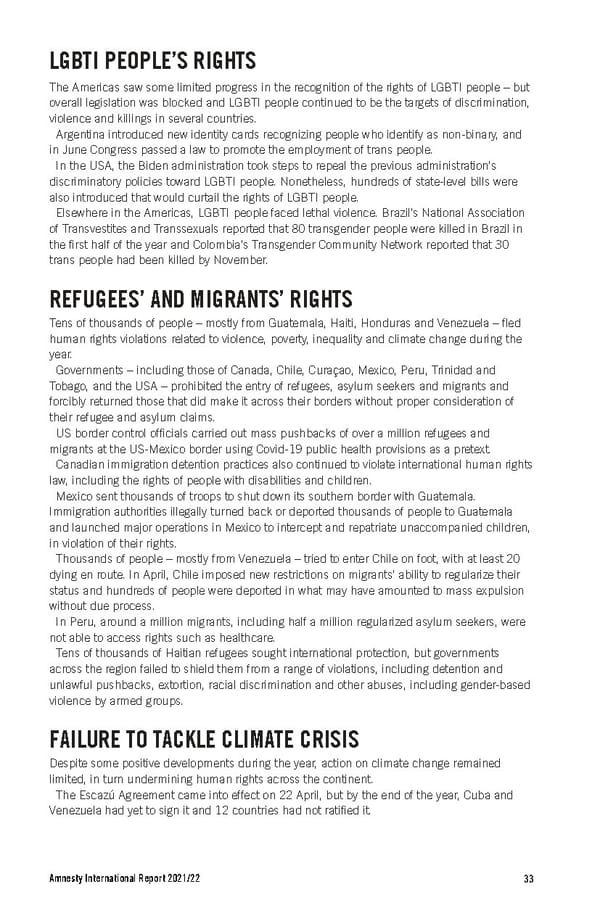LGBTI PEOPLE’S RIGHTS The Americas saw some limited progress in the recognition of the rights of LGBTI people – but overall legislation was blocked and LGBTI people continued to be the targets of discrimination, violence and killings in several countries. Argentina introduced new identity cards recognizing people who identify as non-binary, and in June Congress passed a law to promote the employment of trans people. In the USA, the Biden administration took steps to repeal the previous administration’s discriminatory policies toward LGBTI people. Nonetheless, hundreds of state-level bills were also introduced that would curtail the rights of LGBTI people. Elsewhere in the Americas, LGBTI people faced lethal violence. Brazil’s National Association of Transvestites and Transsexuals reported that 80 transgender people were killed in Brazil in the first half of the year and Colombia’s Transgender Community Network reported that 30 trans people had been killed by November. REFUGEES’ AND MIGRANTS’ RIGHTS Tens of thousands of people – mostly from Guatemala, Haiti, Honduras and Venezuela – fled human rights violations related to violence, poverty, inequality and climate change during the year. Governments – including those of Canada, Chile, Curaçao, Mexico, Peru, Trinidad and Tobago, and the USA – prohibited the entry of refugees, asylum seekers and migrants and forcibly returned those that did make it across their borders without proper consideration of their refugee and asylum claims. US border control officials carried out mass pushbacks of over a million refugees and migrants at the US-Mexico border using Covid-19 public health provisions as a pretext. Canadian immigration detention practices also continued to violate international human rights law, including the rights of people with disabilities and children. Mexico sent thousands of troops to shut down its southern border with Guatemala. Immigration authorities illegally turned back or deported thousands of people to Guatemala and launched major operations in Mexico to intercept and repatriate unaccompanied children, in violation of their rights. Thousands of people – mostly from Venezuela – tried to enter Chile on foot, with at least 20 dying en route. In April, Chile imposed new restrictions on migrants’ ability to regularize their status and hundreds of people were deported in what may have amounted to mass expulsion without due process. In Peru, around a million migrants, including half a million regularized asylum seekers, were not able to access rights such as healthcare. Tens of thousands of Haitian refugees sought international protection, but governments across the region failed to shield them from a range of violations, including detention and unlawful pushbacks, extortion, racial discrimination and other abuses, including gender-based violence by armed groups. FAILURE TO TACKLE CLIMATE CRISIS Despite some positive developments during the year, action on climate change remained limited, in turn undermining human rights across the continent. The Escazú Agreement came into effect on 22 April, but by the end of the year, Cuba and Venezuela had yet to sign it and 12 countries had not ratified it. Amnesty International Report 2021/22 33
 Amnesty International Report 2021/22 Page 32 Page 34
Amnesty International Report 2021/22 Page 32 Page 34